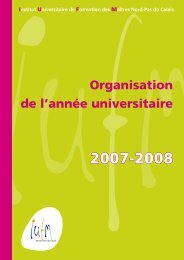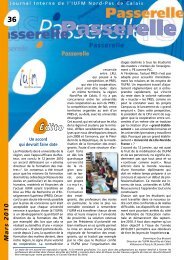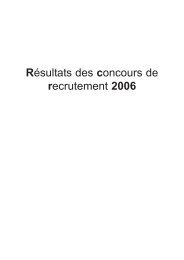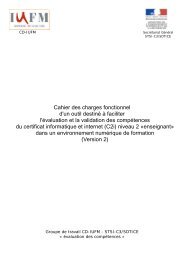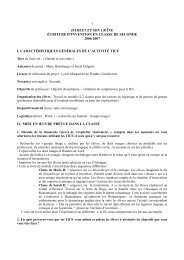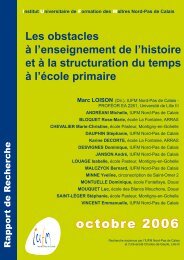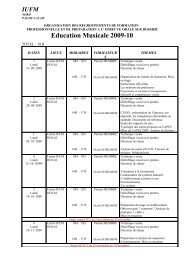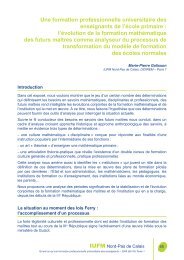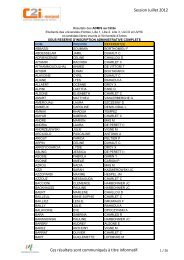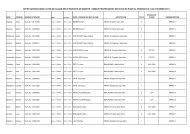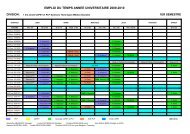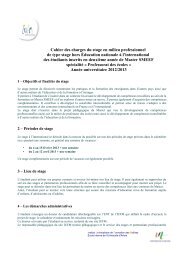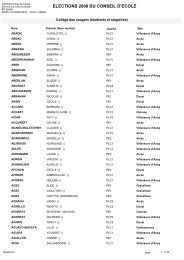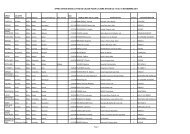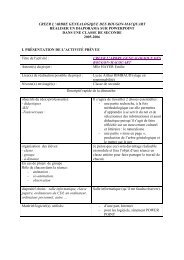You also want an ePaper? Increase the reach of your titles
YUMPU automatically turns print PDFs into web optimized ePapers that Google loves.
Didactic of mathematics and implicative<br />
statistical analysis<br />
Contribution à l’ouvrage col<strong>le</strong>ctif : Statistical Implicative Analysis :<br />
theory and applications, à paraître.<br />
Dominique Lahanier-Reuter<br />
Université Char<strong>le</strong>s-de-Gaul<strong>le</strong>, Lil<strong>le</strong> III<br />
Équipe THEODILE E.A. 1764<br />
dominique.reuter@univ-lil<strong>le</strong>3.fr<br />
Abstract: Didactic of mathematics has constantly regarded statistical implicative analysis<br />
as a profitab<strong>le</strong> and heuristic way of data analysis. We first intend to make c<strong>le</strong>ar reasons of<br />
this interest : implicative links S.I.A. pointed out may be interpreted as ru<strong>le</strong>s and regulations<br />
connecting actions, discourses etc. or as groups characteristics. We develop some examp<strong>le</strong>s<br />
showing how S.I.A. can be used and what special research results it can provide. We insist<br />
upon some points it may be interesting methodologically to focus on : asymmetrics links,<br />
nods and separate implicative ways.<br />
To theorize the relations between these two fields of research in terms of producers of models<br />
and techniques on one hand and on the other in the field of application is without doubt too<br />
reductive, from a historical point of view. In fact the still very brief history of the emergence of<br />
these two scientific domains shows us some more comp<strong>le</strong>x connections : the coincidence of<br />
the time of emergence and recognition, that of their geographical and institutional situations<br />
– some universities and associations of researchers in France – finally and above all the<br />
presence of common actors – Regis Gras particularly – imply dynamic which is specific to<br />
these relations. Thus the implicative analysis of data has been ab<strong>le</strong> to be identified as a<br />
preferred method of analysis in mathematical didactics and reciprocally in some way, some<br />
prob<strong>le</strong>ms of didactics have been ab<strong>le</strong> to raise questions in implicative analysis.<br />
Firstly we seek to clarify the reasons that we see for this fruitful cooperation, in seeking to<br />
understand how the clarification of ru<strong>le</strong>s (or quasi-ru<strong>le</strong>s) that implicative analysis allows<br />
proves to be a valuab<strong>le</strong> and pertinent tool for mathematical didacticians. Then we will explain<br />
two of the princip<strong>le</strong> prob<strong>le</strong>ms in which these ru<strong>le</strong>s have meaning in mathematical didactics :<br />
that of the regulation of observab<strong>le</strong> behaviours of students in a situation and that of controls<br />
in this instance understood as effects of teaching devices.<br />
1. Ru<strong>le</strong>s and regulations<br />
The implicative analysis of data allows us to show ru<strong>le</strong>s, (or quasi ru<strong>le</strong>s) that structure a<br />
set of data from calculations of the co-occurrences of some modalities of variab<strong>le</strong>s. These<br />
ru<strong>le</strong>s can be generically represented by an expression of the type “if A then B”. They are<br />
consequentially hierarchical, that means that they operate a dissymmetry between the<br />
regulated modalities. In this the implicative analysis of data (henceforth S.I.A) is distinguished<br />
from other modes of statistical analysis that, if they are equally based on calculations of cooccurrences<br />
of modalities of variab<strong>le</strong>s, only exhibit symmetrical ru<strong>le</strong>s that therefore do not<br />
<strong>IUFM</strong> Nord-Pas de Calais<br />
105



